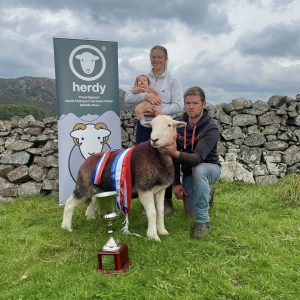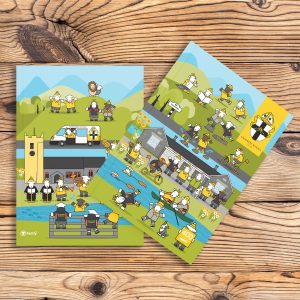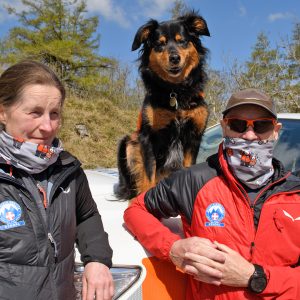Spreading The Herdy Word

Herdy co-founder Spencer Hannah recently attended a meeting of Regional Development Managers from the Rural EU. The delegates were the fund managers and the grant awarders who are responsible for the DEFRA team who identify rural development programmes and give granted support to those projects. A representative of every EU state was there and as well as the fund managers the 110 strong crowd was made up of representatives from other local Cumbrian businesses.
The event was held at the Hawkshead Brewery in Staveley and there was plenty of locally produced food and drink on offer to impress the visiting dignitaries. The group meet every year in different member countries around the EU and this time it was Britain’s turn with the Hawkshead brewery being selected as a showcase success story of what DEFRA/ EU grant funding can achieve.
So why was Herdy there? Well, Spencer was there to talk about our slightly different approach to doing business. He explained about how the business was set up, the philanthropic work we do via the Herdy fund and how important cross sector collaboration is to us and to sustaining the rural community we work within.
The Herdy Company wasn’t started with the assumption of grant funding being available – we’ve always approached things with a different model in mind.
As Spencer puts it: “I was basically putting ideas into their heads about what needs to happen in the future regarding cross sector collaboration in sustainable rural communities. It’s a “strength in numbers” thing, If you take a company like ours, which is a commercial enterprise that needs to generate a profit in order to exist and sustain itself, I explained how as part of its business model we give back by putting back into the community, in our case by The Herdy Fund.
The idea is about people playing to their strengths, for example take a farming community like the Herdwick Upland Fell Farmers – in the past the idea that they would help and support their existence by cross sector collaboration with designers is something that would never have got into anybody's head. The Herdwick branding project we’ve recently been working on, which has also been facilitated with the expertise of Taste Cumbria, has now been proven to increase the value of the money into the back pocket of the farmer by increasing the value of the meat, so we can demonstrate to the EU representatives what “strength in numbers is all about” and the different skills you gain from collaborating with each other.
We take our knowledge and skills in marketing and brand and design and we put them alongside the skills that they have in farming a very unique breed of sheep and all of those collaborations come together to help each other out.”
What was meant to be a 7 ½ minute screen based presentation ended up being a more informal presentation and discussion lasting over 20 minutes as the delegates were keen to understand more about the Herdy story. In their day to day environment the delegates spend a lot of time trying to resolve business problems with monetary funding, this was a real opportunity to see how things could be done differently, by encouraging more businesses to work together to benefit the broader rural community.
(Image courtesy of David Campbell at DEFRA)
The brewery was a great venue and Alex (the owner) did a great job of demonstrating how EU grants can be used to great success. Spencer continued “I don’t think they were expecting me to stand up and say “we haven’t got a clue about this” – we never assumed we’d be obtaining grants in the first place and we are now international – we’re working with all sorts of different people all over the place, we’re sustainable and profitable, so I think that really pricked up ears and it made some of that audience think about the fact that money isn’t necessarily the thing to fix all problems, there are other routes available– relationship building etc.”
With all those dignitaries and local business there, were you nervous Spencer? Not too much – I wasn’t quite sure how to follow on from Alex because he’s an ex BBC reporter – he used to be a foreign correspondent for the BBC, so he knows about standing in front of people and he knows how to reach and audience verbally, so my nervousness was about me being a lot more shy than he is and thinking about talking to 110 people and trying to captivate them with an interesting story. But what worked really well was I didn’t try to put on an elaborate show, I just told them about the business with a few funny anecdotes about amusing things that have happened along the way and I think everybody really connected with that.
I think they connected with the way Alex has achieved all the things he has with the brewery but I think it was refreshing to hear about someone doing it in a different way – without any money and maybe they can go out and tell other people about that.”
What did you take away from the event? “A better understanding of how other worlds tick and a bit of clarity in my own head about how credible we are as a company and from a leadership point of view the opportunity we’ve got to offer guidance and support which we can use ourselves as a best case study example.”
And what’s next? “A couple of the DEFRA people from the UK who work in London were really interested in our business and one guy in particular had a chat about interesting stories to tell about other cross sector working opportunities. DEFRA doesn’t necessarily just involve itself in rural affairs which are hard core farming issues, they could be out of London affairs in ex-industrial areas where there’s a regeneration project so we got talking about the potteries and the Lake District and the potential connection between the two in terms of one industry supporting another.
Take a product manufactured in a traditional area like the Staffordshire Potteries and then get all that product to a rural area like the Lake District where consumers come as visitors who then buy that product and we’ve got a chain reaction of what could happen when all these things connect up, so I think there’s potentially some further engagement that we could look at there.
The “strength in numbers thing” is about thinking outside the box, it’s about people not being insular – not just doing your bit and disappearing. We need to mix it up and work together – that’s the future of sustainable rural community.”





